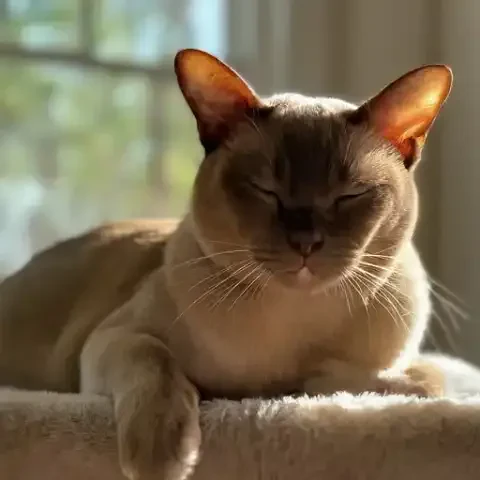Have you ever watched your cat meticulously plan a jump onto a high shelf, delicately manipulate a toy to extract a hidden treat, or seem to perfectly time their adorable antics for when you're most susceptible to giving them attention? Perhaps you've seen them open a door they shouldn't, or masterfully navigate a complex puzzle feeder, leaving you wondering just how much is going on behind those enigmatic eyes. We often hear the stereotype of cats being aloof, independent, even a little less bright compared to their canine counterparts. But to truly understand a cat is to recognize that beneath the purrs and the naps lies a sophisticated and unique form of intelligence, a cleverness that is as captivating as it is often underestimated.
This article aims to delve into the multifaceted cleverness of cats, moving beyond the simplistic notion of obedience or performing tricks. We’ll explore what “cleverness” truly means in the feline world, appreciating that their intelligence is shaped by their evolutionary journey as solitary hunters, perfectly adapted survivors, and masters of their own domain. We will uncover the depths of their problem-solving skills, the nuances of their learning and memory, the power of their sensory perception, the subtleties of their communication, and their remarkable adaptability to a myriad of environments. By the end, you’ll hopefully see your feline companion not just as a pet, but as an incredibly clever creature with a mind as fascinating as their furry exterior.
What exactly do we mean when we talk about a cat being “clever”? It's important to first distinguish cat cleverness from the type of intelligence often celebrated in dogs. Dog intelligence is frequently measured by their eagerness to please humans, their trainability, and their ability to follow commands. This type of intelligence is undeniably valuable, and has cemented dogs' roles as working partners and loyal companions. However, cat intelligence operates on a different plane. It’s less about external validation and more about internal motivation. A cat's cleverness is not driven by a desire to obey or to perform on cue; it's inherently self-serving, deeply rooted in their instinctual drives and needs. It’s about mastering their environment, securing resources, and ensuring their own well-being, often in ways that are far more subtle and independent.
Think about the evolutionary path of a cat. Unlike dogs, who have evolved alongside humans for millennia and were selectively bred for traits that enhance cooperation, domestic cats are only semi-domesticated. Their wild ancestors were solitary hunters, relying on their own wits and abilities to survive. This history has imbued them with a unique set of cognitive skills. Their cleverness is less about group dynamics and pack mentality, and more about individual resourcefulness and keen observation. It's about being an efficient predator, a shrewd strategist, and an adaptable survivor in a world that is often perceived through their exquisitely tuned senses.
To truly understand cat cleverness, we need to consider several key aspects. First, their remarkable problem-solving abilities. Cats are not just creatures of habit; they are active problem solvers, constantly evaluating their surroundings and devising strategies to achieve their goals. Second, their capacity for learning and memory. Despite the myth of the untrainable cat, they are indeed capable of learning and remembering, though their motivations and learning styles may differ from dogs. Third, their extraordinary sensory acuity and observational skills. Cats possess senses that are far sharper than ours, allowing them to gather a wealth of information about their environment that we often miss, forming the basis of their insightful cleverness. Fourth, their sophisticated communication system, which extends far beyond simple meows and purrs. Cats are masters of subtle communication, conveying complex messages through body language, scent, and vocalizations, often subtly training their human companions in the process. And finally, their impressive adaptability and resourcefulness, allowing them to thrive in diverse environments and overcome challenges with creativity and ingenuity.
When it comes to problem-solving, cats are true masters of their domain. Observe a cat in their home environment, and you'll witness a creature constantly engaged in spatial reasoning and strategic planning. Ever seen a cat perched atop the highest point in a room? They didn't get there by accident. They meticulously plotted their ascent, calculating distances, assessing grip, and strategizing the most efficient route. Reaching high places is not just about showing off; it's about gaining a vantage point, observing their territory, and feeling secure – all strategic advantages for a creature whose ancestors hunted from elevated perches.
Consider puzzle toys designed for cats. These are not just frivolous entertainment; they are opportunities for cats to flex their problem-solving muscles. Watch a cat approach a puzzle feeder for the first time. They might sniff it, nudge it, paw at it tentatively. Then, as they observe the mechanism, they begin to experiment. They might try pushing, pulling, rotating, or lifting different parts until, eureka! The treat is released. This isn't random chance; it's a process of observation, hypothesis testing, and learning. Cats are adept at manipulating objects in their environment to achieve their goals, whether it's opening a cabinet door to reach a coveted toy, figuring out how to unlatch a window to gain access to the outdoors, or even devising intricate methods to solicit attention or food from their human companions.
Their problem-solving prowess is deeply rooted in their hunting instincts. In the wild, a cat's survival depends on their ability to locate, stalk, and capture prey. This requires not only physical agility but also considerable cognitive flexibility. They must assess the terrain, anticipate the prey's movements, and adapt their strategy on the fly. This innate hunting drive translates into their domestic lives as well. Even in the comfort of a home, they are constantly "hunting" opportunities, whether it's a sunbeam to bask in, a cozy spot to nap, or a playful interaction with their owner. Their problem-solving skills are honed through these daily "hunts," making them remarkably adept at navigating their world and getting what they want.
The notion that cats are untrainable is a persistent myth, often fueled by comparing them directly to dogs. However, cats are indeed capable of learning and remembering, they simply learn in ways that align with their feline nature. Their learning is often selective, highly motivated, and driven by personal benefit rather than a desire to please. While they may not perform complex obedience routines with the same enthusiasm as some dogs, they are masters of associative learning, quickly connecting actions, sounds, and cues with specific outcomes.
Think about a cat learning routines within the household. They are incredibly adept at anticipating events based on learned patterns. They know when feeding time is approaching, often appearing like clockwork, not because they can tell time, but because they have learned to associate certain cues – the sound of the food bag rustling, your movements towards the kitchen, the time of day – with the reward of food. They learn your daily schedule, anticipating your morning routine, your return home from work, and your bedtime rituals. This isn’t just habit; it’s active learning and memory at play. They are constantly observing, recording, and predicting patterns in their environment.
Cats also possess excellent spatial memory. They can navigate their territory with remarkable precision, remembering locations of resources, hiding spots, and escape routes. This spatial awareness is crucial for their survival and well-being. They remember where food bowls are, where their favorite sleeping spots are, and even the location of potential dangers or threats. This spatial memory is not just instinctual; it's reinforced through experience and learning. They build a mental map of their environment, constantly updating and refining it as they explore and interact with their surroundings.
Furthermore, cats can learn to associate words and sounds with specific actions. Many cat owners will attest to their cats responding to their names, coming when called (selectively, of course!), and understanding certain verbal cues like “no” or “dinner.” While they may not respond with the same zealous obedience as a dog, they demonstrably understand the meaning of these cues. Their learning is often subtle, driven by association and reinforcement, but it’s undeniably present. They may also learn through observation and imitation, watching other cats or even humans and picking up new behaviors or strategies. A young kitten, for instance, will learn hunting techniques by observing its mother. Even adult cats can learn from watching and interacting with their environment, constantly expanding their knowledge and skills.
Underpinning much of a cat’s observational cleverness is their extraordinary sensory acuity. Their senses – sight, hearing, smell, touch, and taste – are all finely tuned, far surpassing human capabilities in many respects. These heightened senses are not just passive receptors of information; they are active tools that cats use to gather and interpret their environment, forming the foundation of their insightful understanding of the world around them.
Consider their sense of sight. While cats don't see colors as vividly as humans, their vision is exquisitely adapted for low-light conditions, essential for nocturnal hunters. Their large pupils and a reflective layer behind the retina, called the tapetum lucidum, allow them to see in light levels that would leave humans effectively blind. This superior night vision enables them to observe their environment and gather information even in near darkness, a critical advantage for predators who are most active at dawn and dusk. Their vision is also particularly attuned to motion, allowing them to detect even the slightest movements of prey or potential threats.
Their sense of hearing is equally remarkable. Cats can hear a much wider range of frequencies than humans, including high-pitched sounds that are inaudible to us. This acute hearing allows them to detect the rustling of prey in undergrowth, the squeak of a mouse hidden behind a wall, or the subtle sounds of approaching footsteps long before we can perceive them. Their ears are also highly mobile, able to rotate independently to pinpoint the source of a sound with incredible precision. This auditory prowess is crucial for both hunting and for being aware of their surroundings, alerting them to potential dangers or opportunities.
The feline sense of smell is legendary, estimated to be at least 14 times stronger than a human’s. Their noses are packed with olfactory receptors, allowing them to detect a vast array of scents and use them to gather information about their territory, other animals, and even their own emotional state through pheromones. Scent marking is a crucial form of communication for cats, leaving olfactory messages for other cats to interpret. They can also use their sense of smell to assess the safety and palatability of food, to navigate their environment, and to detect subtle changes in their surroundings.
These heightened senses are not just about receiving sensory input; they are about actively interpreting that information and using it to predict events and make informed decisions. A cat can predict weather changes based on subtle sensory cues – changes in barometric pressure, shifts in wind direction, or even subtle changes in air humidity, often associated with impending storms, influencing their behavior and activity levels. They can detect the approach of familiar footsteps long before we even enter a room, recognizing the subtle rhythm and cadence of our gait. They can detect subtle changes in human behavior, sensing shifts in mood or stress levels, often responding with comforting purrs or seeking out interaction when they sense we need it. Their senses are their primary tools for gathering information and understanding the nuances of their world, enabling them to be remarkably observant and perceptive creatures.
Cat communication is a language of subtlety, far richer and more complex than simply meowing for food or purring for affection. While vocalizations are a part of their communication repertoire, especially with humans, a significant portion of feline communication is conveyed through body language, scent, and a nuanced understanding of non-verbal cues. To truly understand cat cleverness, one must learn to “listen” to their subtle signals, to interpret the nuances of their posture, tail movements, ear positions, and facial expressions.
Body language is a cornerstone of cat communication. The position of their tail, for instance, can convey a range of emotions from contentment and confidence (tail held high) to anxiety or fear (tail tucked between legs). The angle of their ears, whether forward and alert, flattened in fear, or swiveling to focus on a sound, also provides crucial information about their state of mind. Their posture, whether relaxed and lounging, tense and alert, or crouched and ready to pounce, speaks volumes about their intentions and emotional state. Learning to read these subtle cues is essential for understanding your cat’s communication and responding appropriately.
While often perceived as simply demanding, meows are primarily used by cats to communicate with humans, a learned behavior likely developed to elicit a response from their human caregivers. Cats have developed a repertoire of different types of meows, each subtly varied in tone and pitch to convey specific needs. A short, high-pitched meow might be a greeting, while a longer, lower-pitched meow might signal hunger or demand attention. They can even learn to modulate their meows based on human responses, refining their vocalizations to become more effective at getting what they want.
Beyond vocalizations and body language, scent marking is a crucial form of feline communication, particularly with other cats. Cats use scent glands located on their cheeks, paws, flanks, and tail to deposit pheromones, chemical signals that convey a wealth of information to other cats. Rubbing against objects or humans is not just affection; it’s also scent marking, leaving their olfactory signature and claiming their territory or establishing social bonds. Spraying urine is another form of scent marking, used to delineate territory boundaries, particularly by unneutered males. Understanding scent marking is key to appreciating the complexities of feline social interactions.
Perhaps one of the most fascinating aspects of cat communication cleverness is their ability to "train" their humans. Cats are adept at learning what behaviors elicit desired responses from their owners. Purring, for instance, especially a high-pitched, insistent purr, can be incredibly effective at eliciting attention or food. Rubbing against legs, weaving between ankles, or bringing "gifts" (sometimes less desirable ones!) are all learned behaviors that cats employ to communicate their needs and manipulate their human companions. They are masters of associative learning, quickly realizing that certain actions on their part lead to specific reactions from their humans. This subtle manipulation is a testament to their intelligence and their keen understanding of human behavior, demonstrating a cleverness that extends beyond simple needs-based communication into a more strategic form of interaction.
Finally, cats are remarkably adaptable and resourceful creatures, capable of thriving in a wide range of environments, from the controlled comfort of indoor apartments to the unpredictable challenges of the outdoors. Their adaptability is a testament to their intelligence, their capacity to learn, and their inherent resourcefulness in navigating diverse and often changing circumstances.
Cats can adjust to new environments with surprising ease. Moving to a new home, introducing a new pet, or even rearranging furniture can initially cause stress, but cats are generally adept at adapting to these changes. They explore their new surroundings, map out escape routes, locate resources, and establish their territory, quickly acclimating and re-establishing their sense of security. Their adaptability is not just passive acceptance; it's an active process of learning, adjusting, and finding ways to thrive in new situations.
Resourcefulness is another key aspect of feline cleverness. Cats are remarkably adept at finding creative solutions to access resources, particularly food and shelter. A stray or feral cat, for instance, must be incredibly resourceful to survive in a challenging environment. They must locate food sources, often scavenging or hunting in urban or rural settings. They must find shelter from the elements, seeking out protected spaces like sheds, garages, or under porches. They must navigate social hierarchies and compete with other animals for resources. Their survival depends on their ability to be resourceful, to think creatively, and to adapt their strategies as needed.
Even in domestic settings, cats display resourcefulness in accessing what they need. If a food bowl is empty, they will find ways to communicate their hunger, often employing a range of vocalizations and behaviors to get their owner’s attention. If a favorite toy is out of reach, they will devise strategies to retrieve it, whether it’s climbing, jumping, or manipulating objects to get access. If they desire a particular spot to nap, they will often be persistent and creative in getting comfortable, even if it means squeezing into seemingly impossible spaces.
Cats are also adept at navigating different social structures. In multi-cat households, they establish complex social hierarchies, often subtle and nuanced, but essential for maintaining peace and resource distribution. They learn to interact with other pets, whether dogs, birds, or other animals, often establishing surprisingly complex interspecies relationships. Their adaptability extends to their social interactions, demonstrating a flexibility and intelligence in navigating a wide range of social dynamics.
In appreciating the clever nature of your cat, it’s crucial to think about how we can nurture and stimulate their intelligence within our homes. Providing opportunities for mental enrichment is not just about keeping them entertained; it’s about supporting their cognitive well-being and allowing them to express their natural cleverness.
Puzzle toys and interactive feeders are excellent tools for challenging a cat’s problem-solving abilities. These toys require cats to manipulate objects to access treats, engaging their minds and satisfying their hunting instincts in a safe and controlled environment. Rotating puzzle toys regularly keeps them engaged and prevents them from becoming too predictable. Creating opportunities for exploration and climbing also stimulates their intelligence. Cat trees, shelves, and window perches provide vertical territory, allowing them to survey their surroundings and engage their spatial reasoning skills. Interactive play, especially games that mimic hunting behaviors like chasing a wand toy or stalking a laser pointer (used responsibly), provides mental and physical stimulation, allowing them to express their predatory drives in a playful and enriching way.
Perhaps most importantly, we can nurture a cat's cleverness by respecting their independence and allowing them to solve problems on their own. Resist the urge to immediately solve every challenge for them. Give them time to figure things out, to experiment, and to learn through their own exploration. Observe their behaviors closely, paying attention to the subtle nuances of their communication and their problem-solving strategies. By shifting our perspective, seeing our cats not just as pets but as intelligent, thinking beings with unique cognitive abilities, we can deepen our appreciation for their clever nature and create environments that truly allow them to thrive, both physically and mentally.
In conclusion, understanding your cat’s clever nature requires moving beyond simplistic notions of intelligence and appreciating the unique cognitive abilities that have evolved to serve them so well. From their remarkable problem-solving prowess and selective learning, to their extraordinary sensory perception, nuanced communication, and impressive adaptability, cats are undeniably clever creatures. Their intelligence is not about performing tricks or seeking external validation; it’s about mastery of their environment, securing resources, and ensuring their own well-being in a way that is both sophisticated and uniquely feline. By recognizing and appreciating these multifaceted aspects of their cleverness, we can forge a deeper connection with our feline companions and see them in a new, more appreciative light, recognizing them not just as pets, but as the intelligent and fascinating creatures they truly are. So, take a moment today to truly observe your cat, to “listen” to their subtle communications, to witness their problem-solving in action, and you might just be amazed by the clever nature that unfolds before your eyes.







